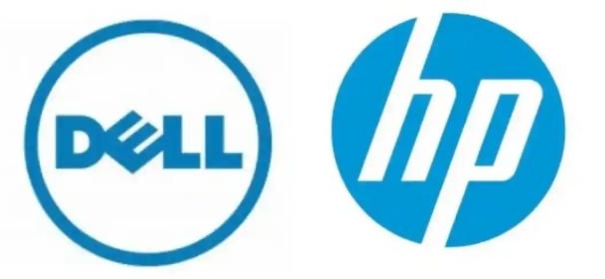
On the evening of November 27, after the US stock market opened, the shares of two well-known computer manufacturers, Dell Technologies and Hewlett-Packard, plummeted at the same time. Dell Technologies fell 12.25 per cent and HP fell 11.36 per cent. HP expects adjusted earnings per share in the range of 70 cents to 76 cents for the first quarter of its new fiscal year, which began Nov. 1, below analysts' expectations of 85 cents per share, according to the data. For the full fiscal year, HP expects adjusted earnings per share of $3.45 to $3.75, with the midpoint slightly below the $3.61 expected by analysts polled by FactSet. HP's outlook came as its latest earnings report, which ended Oct. 31, was mixed. Dell, for its part, expects its revenue for the current quarter, which began Nov. 2, to be between $24 billion and $25 billion, which is below the $25.59 billion expected by analysts polled by FactSet. Its adjusted earnings per share forecast is in the range of $2.40 to $2.60, also below the consensus estimate of $2.65.
The stock prices of the two giants of the United States, Dell and HP, both plummeted, which will have a series of ripple effects and effects on the financial market. The first is the overall impact on the stock market, Dell and HP as leaders in the technology industry, their share prices plummeted easily trigger market panic. That sentiment could quickly spread throughout the tech sector and even affect the direction of the entire stock market. Investors may choose to sell shares because of concerns about the future profitability of the technology industry and the outlook for the market, causing the overall stock market to fall. Dell and H-P are important members of the tech sector, and their plummeting stock prices could trigger volatility across the broader tech sector. Investors need to pay close attention to the trend of the technology sector in order to adjust their investment strategy in time. The plunge in share prices may also reflect an uncertain macroeconomic environment. Sluggish shipment growth in the PC market has become a common phenomenon amid slowing global economic growth, sluggish consumer spending and companies delaying technology investments. This will have a profound impact on the entire tech industry.
The second is the impact on industry valuation and industry competition, Dell and HP's stock price collapse may put them at a disadvantage in the industry competition, as competitors may take advantage of the opportunity to seize market share and introduce more competitive products and services. The collapse in share prices could also trigger an acceleration in industry consolidation, as some of the weaker companies may face greater pressure to survive, while the stronger companies may strengthen themselves through mergers and acquisitions, for example. The plunge in Dell and HP shares could trigger a reassessment of the overall valuation of the technology sector. Because both companies are important representatives of the technology industry, their stock performance is often seen as a bellwether for the industry. As a result, their plummeting share prices could make investors question the valuation of the entire tech sector, which in turn could affect the pricing and trading of tech stocks.
The third is the impact on consumers and investors, the plunge in stock prices is easy to trigger investor panic, leading to more investors choose to sell stocks, thereby further depressing the stock price. This kind of panic can easily trigger a chain reaction in financial markets, affecting the entire technology sector and the overall stock market. The long-term performance of the stock price is an important basis for investors to judge the future prospects and profitability of the company. The plummeting share prices of Dell and HP could raise questions about the companies' future prospects, affecting long-term investment confidence. At the same time, a sharp fall in share prices could easily dampen investor confidence. For investors who hold Dell and HP shares, they may suffer significant losses due to the sharp decline in the stock price, and then have doubts and concerns about the investment. The spread of such sentiment may make investors less confident in the financial markets as a whole, resulting in less investment activity and less market activity.
Taken together, the plummeting share prices of both Dell and HP will have broad and far-reaching implications for financial markets. The industry needs to pay close attention to market dynamics and company fundamental performance in order to adjust investment strategies and reduce investment risks in a timely manner. At the same time, the government and regulators also need to strengthen supervision and risk prevention measures to maintain the stability and healthy development of the financial market.

Recently, according to Al Jazeera, Israel has recently carried out a new round of air strikes on the Gaza Strip, killing about 100 Palestinians, including women and children.
Recently, according to Al Jazeera, Israel has recently carr…
On November 3rd local time, the Foreign Minister of Peru, U…
Recently, TSMC, the leading wafer foundry, stated that it w…
Amazon recently filed a complaint with the Oregon regulator…
In October 2025, the US credit market witnessed a surge of …
When the London gold spot price fell from a high of $4038.9…